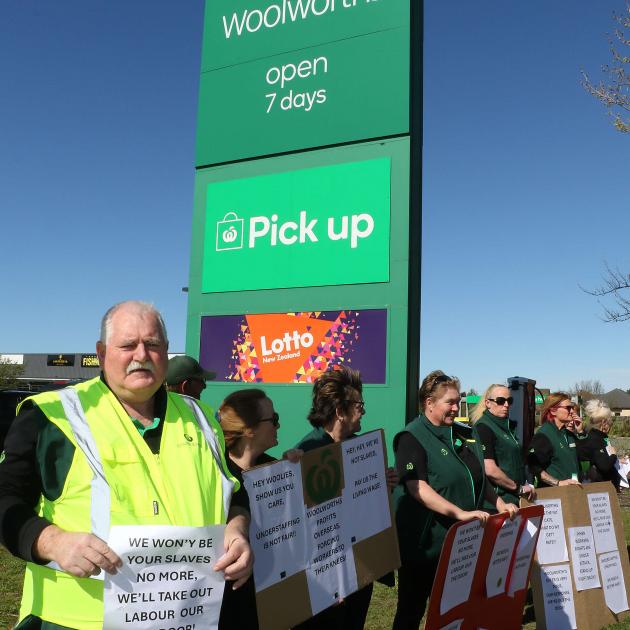‘‘Underpaid, understaffed and undervalued,’’ said many of the signs at a protest in Amberley as Woolworths supermarket workers voted to stage their first ever national withdrawal of labour after 96 per cent of FIRST Union members responded to a weekend strike ballot.
Outside Amberley’s Woolworths supermarket, FIRST Union delegate Mark Humphreys says the Progressive Foods company, the Australian owners of Woolworths, don’t seem to care about their staff.

Mr Humphreys was one of a number of Amberley staff who stood for two hours outside the supermarkets car park on State HIghway 1 in Amberley, protesting the lack of support from the company on Tuesday.
Staff were joined by Woolworths staff from other North Canterbury branches.

‘‘Woolworths have offered minimal wage increases below the rising household cost of living, sought reductions to workers’ existing employment conditions, and proposed pay rates that are falling behind their competitors.
‘‘They are one half of a duopoly that dominates our domestic food market and has churned out more than $1bn in dividends to Woolworths shareholders in the last 5 years. A lack of money is not the issue here - it’s a lack of will, and a lack of ambition.’’

‘‘They’re trying to deal with increasing violence against staff but will not address the number of people working in stores.
‘‘Workers are left feeling that protecting previous profit levels is more important to Woolworths than protecting workers in stores.
‘‘Their solution to systemic understaffing is a nebulous project of ‘multiskilling’ workers rather than increasing the actual number of people working on shop floors during busy hours, nights and weekends. It’s disingenuous.’’

FIRST Union represents approximately 10,000 Woolworths retail supermarket workers in 190 stores around New Zealand, and many more in distribution centres and customer support jobs who are not part of Tuesdays strike action.
FIRST Union's June 2024 survey of supermarket workers showed that 90.8 per cent of respondents said their stores were understaffed, either ‘‘sometimes’’ (36.2 per cent) ‘‘regularly’’ (30 per cent) or ‘‘continuously’’ (24.7 per cent). 39 per cent of workers identified understaffing as the ‘‘single most important workplace issue for supermarket workers’’.













